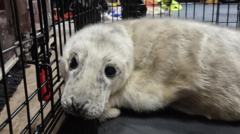How Was an Injured Seal Pup Rescued After Being Separated from Its Mom?

Published: 2025-09-16 08:05:16 | Category: wales
A young seal pup, estimated to be less than a week old, has been rescued from the rocks of Porthcawl seafront, highlighting the ongoing efforts to protect wildlife along the UK coast. The pup was found separated from its mother, suffering from malnutrition and various injuries. After receiving immediate care from the Royal National Lifeboat Institution (RNLI) and British Divers Marine Life Rescue, the seal is now undergoing treatment by the RSPCA before its return to the wild.
Last updated: 19 October 2023 (BST)
Key Takeaways
- A seal pup was rescued near Porthcawl, thought to be less than a week old.
- The pup suffered from malnutrition and injuries to its flippers and chin.
- Rescue efforts involved the RNLI and British Divers Marine Life Rescue.
- The seal is currently being treated by the RSPCA.
- Wildlife rescue operations are critical for protecting injured marine animals.
The Rescue Operation
The RNLI and British Divers Marine Life Rescue were alerted to the presence of the seal pup on the rocks, where it was found alone and vulnerable. This scenario is not uncommon, as young seals often become separated from their mothers due to various factors, including disturbances from human activity or rough weather conditions. Once discovered, the rescuers acted promptly to ensure the pup received the necessary care.
Initial Assessment and Immediate Care
Upon rescue, the seal pup was assessed for injuries and overall health. The team noted that the pup was underweight, with visible injuries to its fore flippers and chin. Malnutrition can severely impact the survival rate of seal pups, making immediate intervention critical. The RNLI transported the pup to their lifeboat station, where it could be monitored and receive initial treatment.
Importance of Marine Wildlife Rescue
The rescue of this seal pup underscores the importance of marine wildlife rescue organisations in the UK. These groups play a vital role in safeguarding marine life, especially as human activities continue to encroach on natural habitats. With increasing reports of distressed marine animals, the collaboration between organisations like the RNLI and British Divers Marine Life Rescue is essential for effective wildlife conservation.
Challenges Faced by Seal Pups
Seal pups face numerous challenges in their early lives, which can lead to situations requiring rescue. Some of the most common challenges include:
- Malnutrition: Young seals rely on their mothers for milk, which is rich in nutrients. Separation can lead to serious health issues.
- Injuries: Pups can sustain injuries from natural predators or human activities, such as fishing gear entanglement.
- Habitat Disturbance: Increased human activity along coastlines can disrupt seal breeding and nursing behaviours.
The Role of the RSPCA
After initial care at the lifeboat station, the seal pup was handed over to the Royal Society for the Prevention of Cruelty to Animals (RSPCA). This charity is known for its commitment to animal welfare and has specialised teams that focus on marine wildlife rescue. The RSPCA will perform a thorough health assessment and provide the necessary treatment to facilitate the seal's recovery.
Steps in the Rescue and Rehabilitation Process
The rescue and rehabilitation process for marine animals typically follows a series of steps:
- Initial Rescue: Teams assess the animal's condition and transport it to a safe location for treatment.
- Health Evaluation: Veterinary professionals conduct a comprehensive health check to identify injuries and nutritional needs.
- Treatment: The animal receives necessary medical care, including wound treatment and nutritional support.
- Rehabilitation: Once stabilised, the animal is rehabilitated in a controlled environment to prepare for release.
- Release: After recovery, the animal is returned to its natural habitat, ideally in a safe area where it can thrive.
Future of the Seal Pup
As the seal pup continues its treatment at the RSPCA, the hope is that it will recover fully and be released back into the wild, ready to thrive in its natural environment. The successful rehabilitation of such animals is crucial for maintaining healthy marine ecosystems, as seals play an integral role in their habitats.
Public Awareness and Support
Incidents like the rescue of this seal pup are an important reminder of the need for public awareness regarding marine wildlife conservation. Local communities can play a significant role in protecting these animals by:
- Reporting injured or stranded marine animals to authorities.
- Minimising disturbances to wildlife habitats.
- Supporting local wildlife charities through donations or volunteer work.
Conclusion
The rescue of the seal pup near Porthcawl serves as a poignant example of the vital work done by marine wildlife rescue organisations in the UK. With the continuous threat of habitat loss and human interference, such efforts are more important than ever. It is essential for individuals to remain vigilant and proactive in protecting the natural world around us. The future of this seal pup rests in the hands of dedicated professionals who are committed to ensuring its safe return to the wild.
What other steps can communities take to support marine wildlife protection? #MarineLife #SealRescue #WildlifeConservation
FAQs
What should I do if I find an injured seal pup?
If you encounter an injured seal pup, do not approach it. Instead, contact local wildlife rescue services or the RNLI for assistance, as they can assess the situation and provide the necessary care.
How can I support marine wildlife conservation?
You can support marine wildlife conservation by donating to relevant charities, volunteering for local rescue operations, and raising awareness about the importance of protecting marine habitats.
What are the signs of a sick or injured seal?
Signs of a sick or injured seal include visible injuries, lethargy, unusual behaviour, and being stranded on the beach or rocks. If you observe any of these signs, seek professional help.
Why are seal pups sometimes abandoned by their mothers?
Seal pups may be abandoned due to various factors, including disturbances from humans, rough weather, or if the mother is unable to care for them due to health issues or injury.
What happens during a seal's rehabilitation process?
During rehabilitation, seals receive medical treatment, nutritional support, and are monitored until they are fit for release back into their natural habitat.



